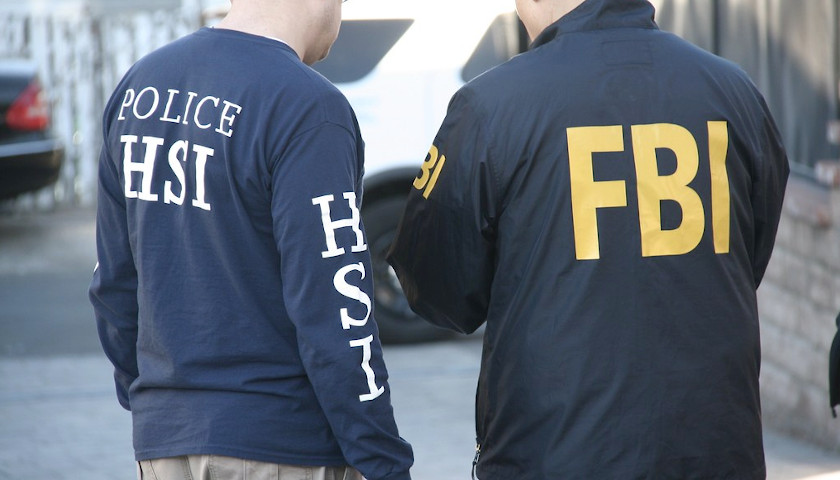by Natalia Mittelstadt
The man who led the FBI Unabomber task force — which ultimately arrested violent suspected terrorist Theodore Kaczynski without deploying a tactical team — is now decrying the use of SWAT teams to arrest Jan. 6 defendants for misdemeanors and warning of the politicization of the bureau.
The FBI doesn’t use SWAT teams for misdemeanors and has rarely used them to arrest nonviolent offenders, said Terry Turchie, former deputy assistant director of the Counterterrorism Division of the FBI, in an interview with Just the News.
Certain criteria must be met to use SWAT, such as the subject of an arrest warrant having a history of violent behavior and owning a firearm, Turchie explained.
FBI whistleblower Stephen Friend says the bureau suspended him from his job recently for raising a range of concerns about the FBI’s and DOJ’s conduct in the Jan. 6 investigation, including the bureau’s use of SWAT teams to arrest Jan. 6 defendants facing misdemeanor charges, thus violating, he alleges, the bureau’s Domestic Investigations and Operations Guide and creating potentially unsafe encounters.
Turchie shares Friend’s concern about the use of SWAT teams in these cases.
“The more you escalate the use of force, the more you take a chance of having possible injuries in some catastrophic failure of agents and civilians alike,” he said.
In his experience, there were even violent cases where SWAT wasn’t used in order “to keep the temperature down,” Turchie added.
Turchie, who led the Unabomber task force, explained how the arrest of Kaczynski occurred without the use of tactical teams.
FBI agents went to Kaczynski’s cabin in Montana to execute a search warrant. While arrests aren’t typically made when executing a search warrant, this “instance was different because we were looking for someone who was unidentified and committing violent acts for 18 years,” Turchie recalled.
While they didn’t use SWAT or HRT teams to arrest Kaczynski, they did pick specific FBI agents from the San Francisco field division who were on a SWAT team, he recounted. However, they were nearby just “to seal off the geographical area around the cabin so he couldn’t escape,” not to make the arrest, he said.
A “low-key” arrest “fooled” Kaczynski, Turchie said, because the FBI sent Forest Service Special Agent Jerry Burns, whom he knew, with two FBI agents. Burns claimed the agents were mining company employees asking about a survey they were doing on the copper mines. Kaczynski had been annoyed by mining companies looking at old abandoned copper mines in the area, so the ruse led him to open the door.
After seeing the three agents, Kaczynski said he was going to get his coat. But as he started to close his door, senior FBI agent Tom McDaniel pulled him out of the cabin, and they began fighting. The other FBI agent, Donald Max Noel, pulled out his weapon and pointed it at Kaczynski, identifying himself as FBI and telling the Unabomber to stop, which he did.
“This was a very, very violent terrorist, and he was becoming more unstable,” Turchie said. “Even there, we didn’t use the SWAT team for the arrest.”
Turchie said that using SWAT for the Jan. 6 misdemeanor arrests is sending a message that’s designed to scare people.
The message from the FBI, he said, is: “You don’t speak up and get involved with the wrong political side, or we’ll teach you a lesson.”
Turchie warned of the increasing politicization of the FBI, citing the depoyment of SWAT teams to arrest nonviolent people like former Trump adviser Roger Stone and pro-life activist Mark Houck.
The FBI wasn’t political when he left in 2001, shortly before 9/11, Turchie recalled. Recently, however, “easy cases” such as Trump-Russia and Hillary Clinton’s emails were “messed up” because the FBI “politicized” them, he said, which “should’ve never happened.”
Former FBI Supervisory Special Agent Jeff Danik told “Just the News, Not Noise” TV show on Monday that declining public trust in the FBI is “a disaster” for agents trying to do their jobs.
“The number one thing an FBI agent has to be able to do is talk to people, gain their trust, and get them to cooperate,” said Danik. “And that’s true of witnesses, targets, subjects, foreign intelligence officers, even prosecutors … Any kind of aura, where a person you contact comes in contact with you with some suspicion about you, it definitely hinders your job performance, ability to get the job done.”
Gerry Mullen, who was an FBI agent for more than 21 years, told Just the News that the only misdemeanor case he ever worked was regarding stolen valor. With nonviolent felony offenders, rather than the FBI using a SWAT team, the offender would receive a summons, he said.
Noel, one of the two agents involved in the arrest of the Unabomber, told Just the News that while the Jan. 6 Capitol riot “was terrible and never should’ve occurred,” the most dangerous period of time in the U.S. for domestic terrorism was in the late 1960s, early 1970s. In 1972, for instance, there were 1,507 domestic bombings, he said.
Just the News interviewed nine retired FBI agents over two days, nearly all of whom said they had never heard of the FBI working on misdemeanor cases. A couple of them even noted that they would have been laughed at by the U.S. Attorney’s Office if they had brought them a misdemeanor case.
All of the retired agents were concerned about the use of SWAT teams to make arrests of the Jan. 6 defendants. Many expressed concern over the politicization of the bureau by FBI headquarters while noting that FBI field agents are good at their jobs.
The FBI didn’t immediately respond to a request for comment Tuesday.
– – –
Natalia graduated from Regent University with Bachelor of Arts degrees in Communication Studies and Government.




